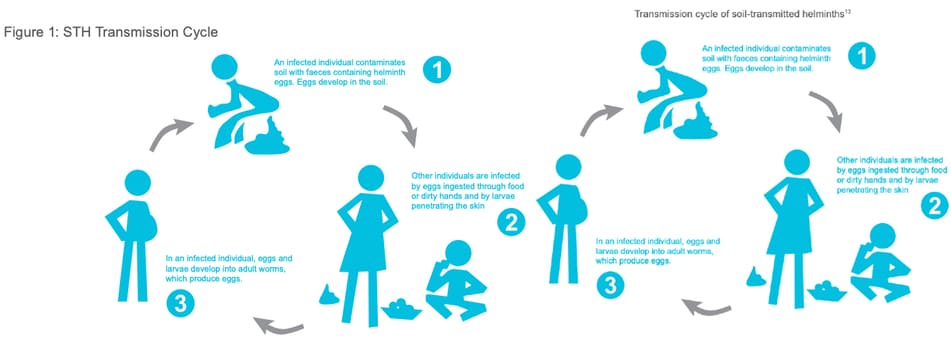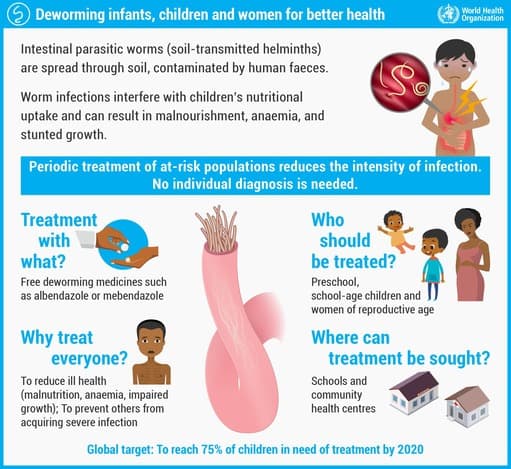Understanding deworming for kids is something every parent should know about. Parasitic infections in children are common in many parts of the world. Parasitic worms including roundworms, whipworms and hookworms, or helminths, affect millions of children, particularly in regions with poor sanitation and limited access to clean water. These infections can harm a child’s health, nutrition, and cognitive development, making deworming an important part of pediatric care. Deworming uses medications to rid the body of intestinal worms, reducing these infections and improving health.

Types of parasitic worms
Kids are commonly affected by several parasitic worms, including roundworms, hookworms, and whipworms. These worms have life cycles that involve swallowing eggs from contaminated soil, water, or food. Once inside the body, these parasites can cause malnutrition, anemia, and impaired growth. Knowing how these worms spread and develop helps with prevention and control. Teaching good hygiene practices, such as handwashing and proper food handling, helps stop the cycle of infection.
Symptoms and diagnosis
Recognizing the signs of parasitic infections can be hard, as symptoms vary depending on the type of worm and how severe the infestation is. Common signs that suggest your child might need deworming include:
- Stomach pain and diarrhea
- Unexplained weight loss
- Constant fatigue
- Anal itching particularly with pinworm infections
- Visible worms in stool
Accurate diagnosis often requires stool tests to identify the presence of worm eggs or larvae. Early detection allows timely deworming treatment and proper medical attention to prevent complications.

Treatment and prevention: deworming for kids
Effective deworming for kids involves both medication and solid preventive strategies.
Medication for deworming:
Deworming medications, such as albendazole and mebendazole, work well for most common parasitic worm infections. These drugs work by paralyzing or killing the worms, allowing the body to pass them naturally, often through stool.
- Prescription is key: Always talk to a pediatrician or healthcare provider before giving any deworming medication. They will determine the right medicine and dosage based on your child’s age, weight, and the specific type of worm suspected or diagnosed. Never self-medicate.
- Age for starting treatment: Deworming treatment can start for children from the age of 1 year. For younger children, especially toddlers (deworming for toddlers often starts around 12-24 months), medications are usually available in syrup form for easier administration. Older children might take chewable tablets.
- Administration: Most deworming medications are given as a single dose, but this can vary. Some may need a repeat dose after a couple of weeks to make sure all worms and newly hatched larvae are eliminated. Always follow the doctor’s instructions precisely.
Frequency of deworming:
Regular deworming programs, especially in areas with high rates of soil-transmitted helminths, are common. Deworming for kids is often recommended once or twice a year (every 6 to 12 months), depending on local public health guidelines and individual risk factors. Your pediatrician will advise on the right schedule for your child.
Preventive measures:
Along with treatment, preventive measures help minimize the risk of reinfection and protect other family members.
Personal hygiene
- Regular handwashing with soap
- Keeping fingernails short and clean
- Using footwear outdoors
Food safety
- Thoroughly washing fruits and vegetables
- Avoiding raw or undercooked meat
- Using clean water for drinking and cooking
Environmental hygiene
- Regular cleaning of living spaces
- Proper disposal of waste
- Maintaining clean toilet facilities
Impact of deworming on kids’ development
The health benefits of regular deworming go beyond immediate symptom relief. By reducing the worm burden, children get better nutrition (as worms no longer compete for nutrients), more energy, and sharper thinking. Studies show that deworming leads to improvements in growth, physical development, and school performance. Children suffering from parasitic infections often miss school due to stomach pain or fatigue. Regular deworming can cut absenteeism significantly, leading to better academic performance and future opportunities. Regular deworming practices can also help break the cycle of poverty by letting children reach their full potential.
Case Studies & Research:
- Deworming in pre-school age children: A global empirical analysis of health outcomes.
- Improved school-based deworming coverage through intersectoral coordination: The Kenya experience Read about WHO Recommendations on Deworming Consider also exploring resources from UNICEF on child health and deworming programs.
Myths vs. facts about deworming for kids
Several misconceptions surround deworming. Let’s clear up some common ones:
Myth: Deworming is only needed if a child shows clear symptoms.
Fact: Many worm infections have no symptoms, especially in early stages. Regular deworming as per medical advice helps eliminate hidden infections before they cause problems.
Myth: Deworming medicines are very strong and have severe side effects.
Fact: Modern deworming medications like albendazole and mebendazole are generally safe for children when given in the correct dosage. Mild side effects like nausea or slight abdominal discomfort are uncommon and usually don’t last.
Myth: Home remedies are as effective as medical deworming.
Fact: While some home remedies might offer mild benefits or symptom relief, they are not a substitute for prescribed drugs, which are proven to eliminate a broad range of parasitic worms. Always consult a doctor.
Myth: Once dewormed, my child is protected forever.
Fact: Deworming treats current infections but doesn’t prevent future ones. Reinfection is possible, especially in areas with poor sanitation. That’s why regular deworming and consistent hygiene practices are needed.
Myth: Deworming is only for children in rural or underdeveloped areas.
Fact: While rates are higher in such areas, parasitic infections can happen anywhere. Children can pick up worm eggs from contaminated soil in playgrounds, sandpits, or even from pets if hygiene is not maintained.
Challenges and considerations
Despite the proven benefits of deworming children, several challenges remain in running effective programs globally and at the family level. Misconceptions and stigma surrounding parasitic infections can slow down deworming efforts. Getting affordable deworming medications and healthcare advice to remote or underserved areas is also difficult. Addressing these challenges requires teamwork between governments, health organizations, communities, and families to raise awareness, clear up myths, and improve access to health services and information. Reliable supply chains for medications and trained healthcare workers for diagnosis and advice also help.
Frequently asked questions (FAQ): deworming for kids
Q. What is the best age to start deworming for kids?
A: Most pediatric guidelines recommend starting deworming treatment for kids as early as one year (12 months) of age, especially in areas where worm infections are common. Consult your pediatrician for advice tailored to your child and location.
Q. How do I know if my child needs deworming? What are the signs?
A: Look for symptoms like persistent stomach pain, unexplained weight loss or poor appetite, fatigue, anal itching (especially at night, common with pinworms), or sometimes visible worms in stool. However, many infections have no symptoms, so regular deworming based on medical advice is often recommended.
Q. What is the typical deworming medicine for kids, and what is the dosage?
A: Common deworming medications include albendazole and mebendazole. These are often available as a syrup or chewable tablet. The dosage depends on the child’s age, weight, and the type of worm. A doctor must prescribe the correct medication and dosage. Typically, it’s a single dose, but sometimes a follow-up dose is needed.
Q. Are home remedies effective for deworming children?
A: While some traditional remedies are believed to help, their effectiveness is not proven to match prescribed medications. For effective treatment of parasitic worms, medical consultation and prescribed drugs are strongly advised.
Q. Are there any side effects of deworming medication for kids?
A: Modern deworming medicines are safe with minimal side effects. Some children might experience mild and temporary issues like nausea, vomiting, stomach discomfort, or headache. These usually pass quickly. If you notice any severe or lasting side effects, consult your healthcare provider immediately.
Q. How frequently should kids be dewormed? Is it different for toddlers?
A: The frequency of deworming depends on factors like the local rate of worm infections and individual risk factors. In many areas, deworming is recommended once every 6 to 12 months. The schedule for deworming toddlers is generally the same as for older children once they start treatment, but always follow your pediatrician’s advice.
Q. Can deworming prevent other health problems in kids?
A: Yes. Regular deworming can help prevent complications from chronic worm infections, such as malnutrition, anemia (iron deficiency), stunted growth, and impaired cognitive development. This supports overall health, improves school attendance and performance.
Q. How do I prepare my child for deworming?
A: Usually, no special preparation (like fasting) is needed unless specified by your doctor. Explain to older children in simple terms why they are taking the medicine. For younger children and toddlers, make sure they can swallow the syrup or chewable tablet safely. It can often be given with a little food.
Q. What should I expect after my child is dewormed?
A: Most children feel fine. You might notice worms in the stool for a few days as they are passed, which is normal. If symptoms like stomach pain were present, they should start to improve. Make sure your child drinks plenty of fluids.
Q. Is deworming necessary if my child has no obvious symptoms?
A: Yes, it often is, especially in areas where infections are common or if recommended by your pediatrician. Many worm infections don’t show obvious signs until the infestation is heavy. Preventive deworming helps eliminate worms before they can cause health problems.
Q. Can deworming for toddlers be done with the same medication as older kids?
A: Yes, medications like albendazole and mebendazole are used for toddlers and older children, but the dosage and form (syrup vs. tablet) will be adjusted by the doctor based on age and weight.
Q. Where can I get more information on deworming programs?
A: Authoritative sources include the World Health Organization (WHO), UNICEF, and your local Ministry of Health or pediatric associations. (Consider linking to a relevant internal article on child wellness if available).
Addressing common concerns
Parents often have questions and concerns about deworming their children. Here’s a quick recap:
- Safety of medications: As mentioned, prescribed deworming drugs are generally safe for children, including toddlers, when used as directed by a doctor.
- Mild and temporary side effects: Be aware that minor side effects like temporary nausea or mild stomach discomfort can occur but usually pass quickly.
- Sticking to the schedule: Following the deworming schedule recommended by your healthcare provider helps keep your child protected.
- Prevention is a partnership: Medication alone isn’t enough. Combine deworming with consistent hygiene practices for the best results.
Read about WHO Recommendations
Community health programs Community-based deworming programs for children help with:
- Raising awareness about parasitic infections
- Providing access to deworming medications
- Putting preventive measures in place
- Tracking treatment effectiveness
Conclusion
Regular deworming for kids is a safe and simple way to fight parasitic infections and is important for their overall health, growth, and development. By understanding the symptoms, recommended treatments, and the importance of prevention, parents can take steps to protect their children’s health and wellbeing. Good hygiene practices combined with regular, medically guided deworming help children thrive.